
Depression is a common disease affecting more than 300 million people. The most serious consequence is suicide. Around the world, nearly 800,000 people commit suicide every year because of depression. This is a serious mental illness that has a major impact on the social and professional function of the sick. Recent studies have shown that inflammation and the brain seem to drive the development of depression; the innate and adaptive immune systems interact with neurotransmitters and neural circuits that affect the risk of depression. Inflammation is an important biological event that may increase the risk of depression, similar to traditional psychosocial factors.
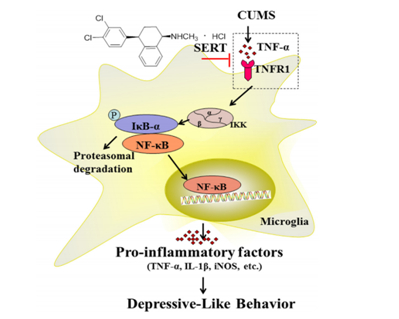
Numerous clinical reports have shown that proinflammatory cytokines, tumor necrosis factor-α (TNF-α), and interleukin-1β (IL-1β) are significantly higher in the patients with depression than in the control group. Nuclear factor-kappaB (NF-κB) is a major regulator of the inflammatory pathway, regulating inflammatory cytokines such as tumor necrosis factor TNF-α, IL-6 and IL-1 as well as anti-apoptosis and tumors. There is evidence that inflammation plays a crucial role in depression, so the identification of new antidepressants may be screened for by their anti-inflammatory effects.
Sertraline improves inflammatory response in CUMS mice and inhibits TNF-α-induced inflammatory responses in glioma cells to achieve antidepressant
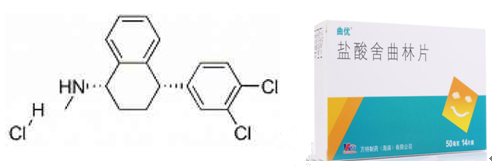
Sertraline hydrochloride (SERT), a widely used antidepressant, has anti-inflammatory effects in clinical studies, but its mechanism of action remains unclear. The research team from Yanbian University used OpenSPR's innovative LSPR technology rapid dynamics analysis tool and combined Elisa, western and fluorescence analysis to analyze the antidepressant mechanism of SERT.
 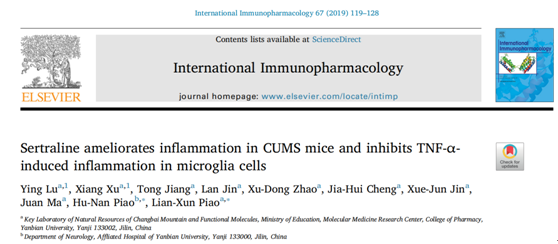
Experimental content
1) The experimental mice undergo a series of irregular stimulation such as starvation, hot and cold water bath, clip tail and SERT treatment, etc., and then blood is used to analyze the effect of SERT against inflammatory factors iNOS, IL-1β, TNF-α by Elisa;
2) Cultured BV2 cells were treated with SERT, SERT+TNF-α for 24 hours and treated with DMSO, and the expression of Iba-1, iNOS, TNF-α, IL-1β, NF-κB p65 and other factors were determined by Western immunoassay. Fluorescence analysis of NF-κB p65;
It was found that SERT increased the activity of mice, inhibited the expression of Iba-1 and the inflammatory response in brain tissue and serum, and inhibited the NF-κB pathway, while also inhibiting TNF-α-induced NF-κB activity and BV2. active.
Finally, to determine whether TNF-α-induced inflammatory factors directly interact with SERT and the optimal concentration of SERT required, the authors used OpenSPR to determine the interaction between TNF-α, TNFR1 and SERT, data 1:1 fit. The analysis obtained kD values ​​of 9.93 uM and 4.89 uM, respectively.
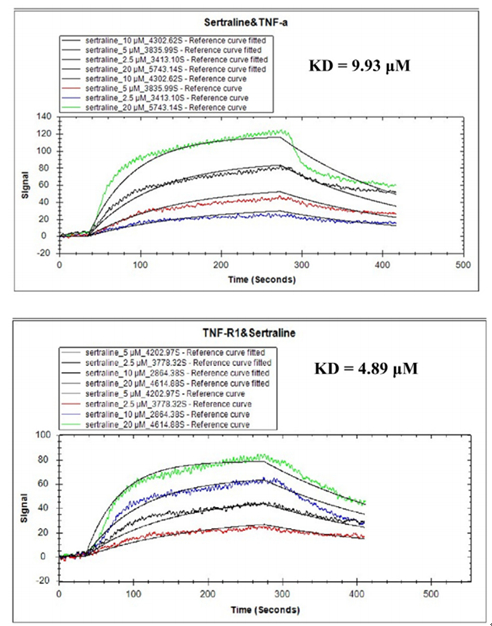
in conclusion
SERT treatment is effective in reducing the levels of major inflammatory cytokines (TNF-α, IL-1β and iNOS) in peripheral and central tissues significantly under mild stress (cums), inhibiting NF-κB phosphorylation and B cell IκB-α Phosphorylation of nuclear factors. In addition, SERT reduces the level of transaminase in serum.
Finally, through the fast and simple multi-parameter kinetic analysis of OpenSPR LSPR technology, SERT can directly determine the direct action of SERT on TNF-α and TNF-α receptor 1 (TNFR1), and can effectively block the signal triggered by TNF-α/TNFR1. Finally, inhibition of NF-κB signaling pathway activates microglia and achieves depression treatment; thus clearly elucidating the antidepressant effect of SERT and providing a basis for the research and development of antidepressants. Reduces the expression of inflammatory and inflammatory mediators.

The uniqueness of OpenSPR molecular interaction instrument in the development of drug for depression
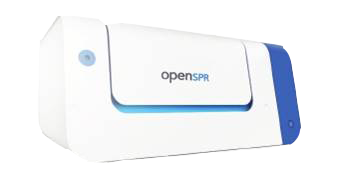
• Innovative LSPR technology --- detection is not affected by temperature and buffer refractive index;
• Multi-parameter detection---Ka, Kd, ​​KD, EC50, protein concentration determination;
• Simple operation – modular prompts, 1-2 hours to control;
• High performance - molecules larger than 90Da;
• No need for dedicated correction channels – negligible bulk effects;
• CO-IP---real-time CO-IP in 2-3 hours;
Smart Door Lock,Smart Security Door Locks,Fingerprint Smart Door Lock,Electronic Key Card System Smart Lock
Shenzhen Bio Technology Co., Ltd , https://www.huifantech.com